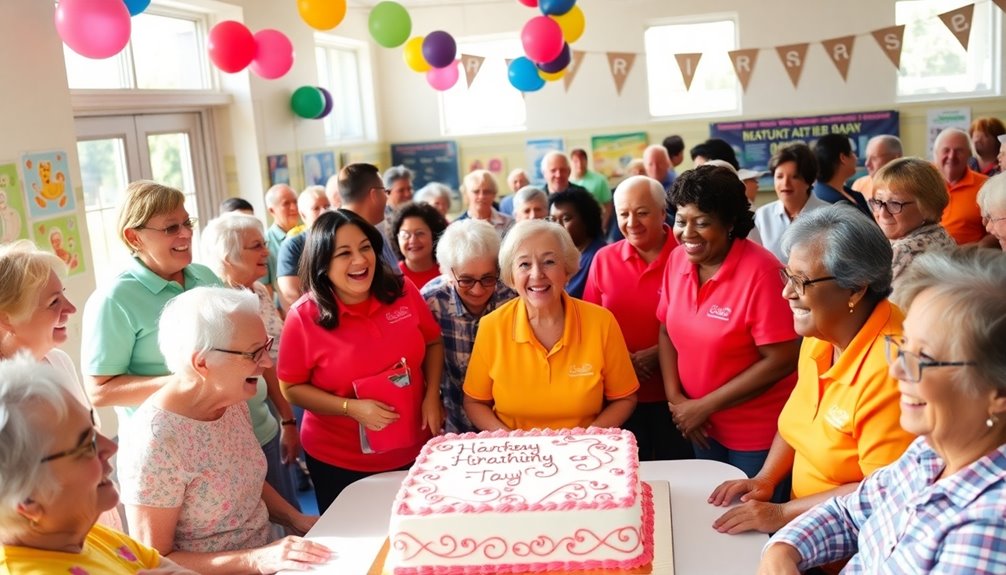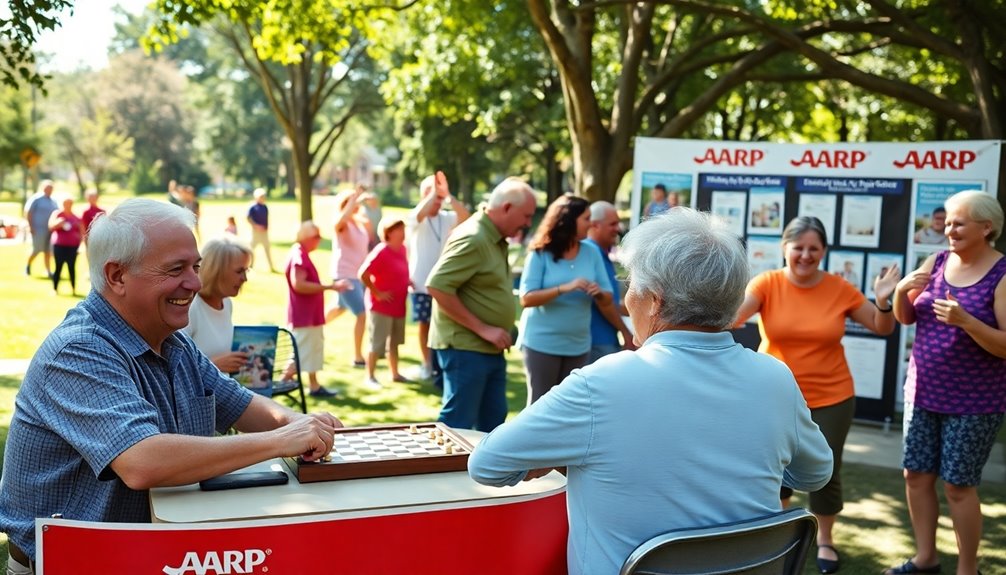If you're a lonely widower yearning for intimacy, know that you're not alone. It's normal to seek connection after loss. Start by crafting an honest online profile that reflects your journey and interests, focusing on emotional intimacy rather than just physical needs. Engage in meaningful conversations and set clear boundaries. Remember, it's okay to feel guilt; seeking new relationships doesn't diminish past love. Explore community insights and find like-minded individuals who share your interests. You might discover valuable tips and stories from others traversing similar paths that can help you on this journey.
Key Takeaways
- Seek connections with age-appropriate women who share your interests to foster companionship and emotional healing.
- Be honest in your online profile about your journey and desire for intimacy, focusing on emotional needs.
- Understand that feelings of guilt are normal; seeking intimacy does not diminish your past love or mourning process.
- Establish clear boundaries in new relationships to enhance emotional well-being and avoid misunderstandings.
- Engage in intellectual conversations and caregiving experiences to deepen connections and create stability in your new relationships.
Desire for Connection
After losing a partner, the yearning for connection can feel overwhelming. You might find yourself craving companionship that goes beyond mere physical intimacy. Engaging in intellectual conversations can bring back memories of your late wife and provide a sense of comfort. Seeking out age-appropriate, stimulating women who share your interests can help you navigate this new chapter. While friends may voice concerns about your dating during this grief period, your desire for affection and social engagement is valid.
It's okay to look for non-committed relationships that fulfill your emotional needs without the pressure of long-term commitment. Embracing these feelings can lead to meaningful interactions and help you rediscover joy in your life. Remember, establishing clear boundaries in these new connections can enhance your emotional well-being. In the midst of this journey, remember that emotional disconnection can be a common experience for those who have suffered loss, making your quest for connection even more essential. Additionally, incorporating effective relaxation techniques into your routine can help manage the emotional ups and downs you may experience.
Additionally, professional counseling can provide valuable support as you navigate these new relationships and emotions. Don't shy away from seeking that connection—you deserve it.
Crafting an Online Profile

Creating an online profile that genuinely reflects who you are can be a powerful step towards finding connection. Be honest about your journey and what you seek. For example, consider phrasing like "Lonely widower, 73, seeks intellectual woman, 65-75." Use gentle terms like intimacy and touch instead of direct mentions of sex. Highlight the value you bring to a relationship, such as stimulating conversations or shared interests. Sharing your caregiving experience can foster deeper connections, as many individuals appreciate the emotional well-being that comes from pet therapy interactions. Here's a simple table to guide your profile creation:
| What to Include | How to Phrase It | Why It Matters |
|---|---|---|
| Your Age | "73 and seeking connection" | Sets the stage for compatibility |
| Interests | "I enjoy books, music, and nature." | Attracts like-minded individuals |
| Relationship Goals | "Looking for companionship and warmth." | Clarifies your intentions |
Additionally, consider the importance of maintaining involvement in your new relationship to foster a sense of stability and connection.
Understanding Guilt

Steering the path of new connections after loss can stir up feelings of guilt that many don't expect. You might wonder if seeking companionship means you're forgetting your late partner, but it's important to understand that these feelings are common.
Mourning isn’t a linear process, and as a caregiver, you may have started grieving long before your loved one passed. It’s perfectly valid for your emotional and physical needs to arise shortly after a loss. Recognizing and honoring your own feelings during this time is essential to your healing journey. It’s also important to reflect on the moments that remind you why caregiving brings you joy, as these memories can provide comfort amid the grief. Embracing the complexity of your emotions allows for a deeper understanding of your experience, helping you to move forward while still cherishing the love you shared.
Remember, there's no timeline for grief, and wanting intimacy doesn't diminish the love you had. Exploring literature on grief and sexuality can help clarify these feelings, reassuring you that seeking connection is a natural part of healing.
Embrace your needs; they're part of moving forward.
Submitting Questions to Joan

Often, you might find yourself with questions about maneuvering the complexities of dating and intimacy after loss.
To submit your inquiries to Joan, remember you must be 60 or older. It's important to craft a clear and interesting backstory to enhance your question's effectiveness.
Before reaching out, consider reviewing previous columns for insights on similar topics; this can spark ideas and save you time.
Joan emphasizes public responses, but if your situation requires personal guidance, private consultations are also available.
To submit your questions, simply email sexpert@seniorplanet.org.
With thoughtful submissions, you'll not only find answers but also connect with others maneuvering similar paths.
Don't hesitate—your questions could help illuminate the journey for many.
Community Responses

Here are three key aspects to reflect on:
- Age Restrictions: You may encounter varied opinions on dating preferences, particularly regarding age, which can complicate your search for companionship. Additionally, understanding the emotional impact of caregiving can help you approach new relationships with sensitivity. Recognizing the importance of strong communication skills can facilitate better connections as you navigate dating. Being aware of narcissistic behaviors can also help you identify potential red flags in new partners. Remember that astrological compatibility can play a role in how well you connect with someone new.
- Intentions: It's essential to clarify your relationship intentions upfront to avoid misunderstandings with potential partners. Being open about your needs can create a more honest and fulfilling connection.
- Emotional Impact: The emotional toll of caregiving can affect your mourning process, highlighting the need for understanding and support from others. Additionally, being aware of narcissistic behavior in potential partners can help you protect your emotional well-being.
Recognizing these community insights can help you navigate your journey toward connection. Joan's advice sheds light on these complexities, reminding you that seeking companionship is a natural part of healing.
Frequently Asked Questions
How Can I Overcome Social Anxiety When Dating Again?
To overcome social anxiety while dating, start small. Practice relaxation techniques before meetings, focus on shared interests, and remind yourself that others share your feelings. Gradually, you'll build confidence and enjoy connecting with new people.
What Are Some Tips for Maintaining Healthy Boundaries in New Relationships?
To maintain healthy boundaries in new relationships, communicate openly about your feelings and expectations. Trust your instincts, set clear limits, and remember that it's okay to take things slow as you navigate your emotions.
How Do I Handle Rejection as a Senior Dater?
Rejection feels like a meteor crashing into your heart! But remember, it's not personal. Embrace the journey, learn from each experience, and keep seeking those who appreciate your unique charm and wisdom. You've got this!
What Activities Can I Do to Meet Potential Partners My Age?
To meet potential partners your age, try joining local clubs or classes, volunteering, attending community events, or participating in group activities. These settings foster connections through shared interests, making it easier to engage with others.
How Should I Approach Discussing My Late Spouse With New Dates?
When discussing your late spouse with new dates, be honest yet gentle. Share cherished memories, emphasizing your journey. This openness fosters connection, showing you're still managing grief while seeking companionship and understanding in new relationships.
Conclusion
As you step into this new chapter, think of yourself as a garden that's ready to bloom after a long winter. Just like flowers need sunlight and care to thrive, you deserve the warmth of meaningful connections. Embrace the journey of dating, knowing that it's okay to seek joy and intimacy again. Remember, every new relationship can be a seed planted for growth, transforming your landscape of life into something vibrant and fulfilling. You're not alone on this path.










